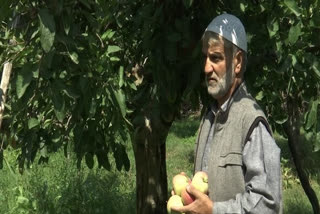New Delhi:In an important step towards the promotion of Horticulture produce of Jammu & Kashmir and to take it to the global market, the J&K Government on Friday signed a Memorandum of Understanding (MoU) with the National Agricultural Cooperative Marketing Federation of India Ltd. (NAFED), an apex organization of marketing cooperatives for agricultural produce in the country.
The MoU with NAFED is seen as a game-changer for the Horticulture sector in Jammu and Kashmir as it has the potential to increase the income of farmers by 3 to 4 times by implementing High-Density plantation of apple, walnut, cherry and flowers.
After signing of the MoU, NAFED to cover 5,500 hectares at a cost of Rs 1,700 Crore in the next five years with the major focus on apple and other significant horticulture produce. NAFED will also set up 20 farmer-producer organizations, one in each district, in the next three months.
The NAFED will set up three cold storage clusters, one each in North Kashmir, South Kashmir and Kathua at a cost of Rs 500 Crore, besides ensuring Geographical Indications tags (GI Tags) for all premium/niche horticulture produce, branding and marketing of fruit crops like Apple, Walnut, Cherry, Olive, Litchi etc.
In presence of Manoj Sinha, Lieutenant Governor, UT of J&K, the MoU was signed between Sh. Navin Kumar Choudhary, Principal Secretary to the Government, Agriculture and Horticulture Department, J&K and Sanjeev Kumar Chadha, Managing Director, NAFED.
Speaking on the occasion, Sinha observed that the J&K Government is tirelessly working on four issues that are being addressed on priority -increasing productivity through the intervention of technology; ensuring best price and market support; mitigation of risks, and diversification through allied activities.
Also Read: Three militants killed in Srinagar gunfight are innocents, claim families
The Lt Governor said that horticulture produce of Jammu division will be given a major push for marketing and NAFED will also look into the possibility of the high-density plantation of apple in Kishtwar and Bhaderwah.
“The UT Government will work with NAFED to promote horticulture produce and to set up a quality planting material lab. GI tagging of all premium horticulture produce and marketing on the top priority of the administration. The investment in various areas to promote and market horticulture produce is being made for faster expansion. We intend to increase Cold Storage capacity, identify and promote horticulture produce of Jammu division to ensure better price to farmers,” the Lt Governor said.
As per the MoU, NAFED with J&K Government will create post-harvest infrastructure for agriculture/horticulture crops in the form of cold atmosphere stores, grading and processing facilities in future at the locations decided by the UT administration. Besides, implementation of the high-density plantation, NAFED will develop hi-tech nurseries for raising rootstock and also import it to facilitate the farmers.
This historical initiative involves setting up virus indexing labs as per latest protocol for testing of quality planting material. The MoU has given a major thrust to marketing. The NAFED with J&K Government will work on branding and marketing of fruit crops and establishment of market linkages for exotic and non-seasonal vegetables and flowers in different metro cities of India.
Managing Director, NAFED said that the organisation will work in a time-bound manner on each point to increase productivity and also ensuring availability of hybrid vegetable seeds and high-value exotic vegetable seeds while giving special focus to popularize aromatic plants of Jammu division.
Choudhary said that all the required infrastructure including cold storage and processing facilities will be made available in a short span of time to take horticulture of Jammu and Kashmir in the global market. The robust mechanism for branding and marketing of horticulture produce and market linkage within the country will revolutionize the agriculture and horticulture sector in Jammu and Kashmir, he added.
Also Read: Kashmir 'kills' spike in 2020 but rising local recruits main worry
